- Home
- Sara Shepard
The Heiresses Page 2
The Heiresses Read online
Page 2
Bettina fluffed Corinne’s skirt and met her gaze in the mirror. “So. What is it like to be the bride in the wedding of the century?” Her thickly accented voice was rich with admiration.
A rehearsed smile snapped onto Corinne’s face. “Please. The century has only begun.”
“Yes, but Dixon Shackelford.” Bettina shuddered with delight.
Corinne pushed her dirty-blond hair behind her ears. She’d been with Dixon since their sophomore year at Yale. Well, except for that one summer just after graduation—but Corinne had always liked a story with a happy ending, and she’d neatly trimmed that interlude from her personal history. His mother was British, his father Texan, and Dixon himself was her mother’s dream come true—a blue blood on both continents, heir to the Shackelford Oil fortune, affable to a fault.
Bettina lifted Corinne’s veil from its dark-blue box on a nearby sideboard. “And now you’re going to be a princess!”
Corinne waved her hand. “There’s not much of a chance of that. His mother is the queen’s fourth cousin twice removed. Or something,” Corinne said, feeling she had to add the or something even though she knew precisely where Dixon’s mother fell on the royal family tree.
Bettina put her hands on her hips. “That makes you more of a princess than any of us. Now, let me see that ring again.”
Corinne held out her hand. Dixon had given her a large, canary-yellow diamond set in platinum—an homage to the Corona Diamond, the very first stone that her beloved grandfather, Alfred, had acquired when he fought in World War II. Before that, Alfred had owned a fledgling jewelry store in Boston, but the acquisition of the Corona had launched the business into a new stratosphere.
“Stunning,” Bettina gushed, staring at the ring. Then she pinned the veil on Corinne’s head. Poppy rose to help, and together they pulled the veil over Corinne’s eyes and let it trail in front of her face. “This is how Dixon will see you on your wedding day.”
Your wedding day. Corinne’s smile wavered a tiny bit. With all the pomp and circumstance, Corinne sometimes forgot this wasn’t another charity event committee she was heading up, and that she was actually getting . . . married.
Before she could let the notion truly sink in, the door to the salon flung open, bringing with it a gust of wind and a few sprinkles of rain. A woman in a black trench coat stood in the doorway, battling with an inside-out umbrella. She wrestled with the metal spokes and flimsy fabric, a thin curl of cigarette smoke appearing over her head. “Motherfucker,” she grumbled, finally winging the crumpled umbrella to the sidewalk just outside the door. Then the tall, blond, beautiful woman turned to face them.
Corinne sucked in her stomach. It was her sister, Aster.
Aster teetered in on jet-black five-inch laser-cut booties. A hand-rolled cigarette dangled from her lips, the stench of tobacco overpowering the salon’s light floral scent. Her wet trench dripped puddles on the mahogany floor. Her fuchsia dress, also wet, clung high on her thighs. Though Aster would have still been striking even after a roll in a city Dumpster, there were circles under her large, luminous blue eyes, and her ice-blond hair was matted. She had a disoriented, used-up look about her. Corinne wondered if her younger sister had just emerged from a stranger’s bed after one of her typical all-night bacchanals.
“I’m here!” Aster announced in a husky, slurring voice. Then she stopped in the middle of the room, her gaze on Corinne. “Whoa, mama,” she said. “That dress should not be white.”
Corinne tried to speak, but she didn’t know what to say. Aster took a drag and exhaled blue-tinged smoke toward the vaulted ceiling. “Nice choice, by the way. Love the lingerie look—you can skip straight to the wedding night.” When she leaned toward Corinne to inspect the lace, her breath smelled of cigarettes, booze, and orange Tic Tacs.
A prickly feeling shot from Corinne’s core all the way to her fingertips. “Have you been drinking?” she hissed, glancing at the clock on the wall: 10:30 a.m.
Aster lifted one shoulder. “Of course not!” She lurched sideways in an attempt to sit down, but missed the large leather wing chair completely, her legs going out from under her. “Oops!” she cried. Bettina and Poppy rushed forward to help her up. “I’m okay!”
Corinne shut her eyes and tried to stay calm, but all she felt was hot, pulsing embarrassment. As soon as Aster was on her feet again, Corinne shot her arm forward and plucked the cigarette from Aster’s lips. “You can’t smoke in here,” she snapped.
Bettina rushed forward. “It’s fine,” she said in a meek voice.
But Corinne dropped the still-lit cigarette into a glass of water. It fizzled as it went out, the only sound in the suddenly still salon. “Actually, Aster, I think you should leave,” she announced, her voice wavering.
Aster blinked, then scoffed. “You asked me to come.”
“An hour ago,” Corinne said coolly. “And now we’re almost done.”
Aster shrugged. “So I’m a little late.”
Corinne shifted her gaze to the right, focusing on the cigarette butt in the water glass. There was a tinge of pink lipstick on the filter. Her throat welled with words, but it wasn’t as if she could say them. She glanced at her mother for support, but Penelope just sat there, gripping her knees.
Poppy appeared next to Aster and touched her arm. “Maybe you should go, honey,” she told Aster in that kind, gentle-but-motherly voice Poppy had mastered but Corinne could never quite pull off. “Sleep it off. You’ll feel much better.”
Aster stuck her lip out in a pout, but didn’t resist when Poppy took her arm and guided her away from the pedestal. The two of them walked toward the door, and Poppy scooped up her own Burberry umbrella from the metal basket and placed it in Aster’s hands. In moments, Aster disappeared and the door slammed behind her.
Poppy walked coolly and confidently to Corinne’s side, smiling brightly. “Come on,” her cousin said, lifting the veil from Corinne’s eyes. She guided her back to the dressing rooms. “Show us your reception dresses. It’ll be okay.”
“I know,” Corinne said grumpily. Then she looked down at her dress. She’d worried off one of the pearl embellishments on the bust. Bettina rushed forward with a needle and thread and quickly sewed it back on.
Once Corinne was back in the dressing room, she stared at herself in the mirror, something she often did after being side by side with Aster. Even in a wedding dress, Corinne couldn’t compete with Aster’s radiant beauty. Corinne spent enough money on her looks, but her long forehead, square jaw, and thick eyebrows equated to something more handsome than pretty. Her shoulders were broad like her father’s, her chest small like her mother’s, her legs too thick and pale even after hours of Pilates, countless meals uneaten, and thousands spent on spray-tanning. You’re good stock, her mother had told her when she was eleven years old. She meant it as a compliment, but it made Corinne think of a prizewinning heifer in a county fair. Penelope had certainly never referred to Aster as stock, no matter what she pulled.
It had always been that way. Her parents made excuse after excuse for Aster. Corinne used a knife and fork at eighteen months, Aster threw her food against the wall well into preschool. Corinne studied during recess, while Aster bought test answers on the playground. But their parents always looked the other way. Mason had actually favored Aster, celebrating when Aster got a B, as if she had to do little more than show up for class to earn it.
Corinne preferred her mother’s company anyway, enjoying long, girly weekends of tea at the Plaza and spa trips to Elizabeth Arden when Aster and Mason took one of their special trips to Meriweather or the Berkshires. But with her mother’s attention also came her criticism and instruction. Penelope had come from old money, made a hundred years ago on railroads, and she was very specific about how her daughter should behave. Study French. Attend Junior League. Dress in classic lines. Marry well.
Did they instill any of those values in Aster? Corinne doubted it. The two of them had gotten along as kids—one of Corinn
e’s favorite memories was holding tightly on to Aster’s hand as they stared, transfixed, at the Macy’s Thanksgiving Day parade floats from a friend’s penthouse on Central Park West. They grew apart as they got older, though . . . and when Aster stopped listening to her. Did their parents give Aster a wide berth because she was beautiful? Did they figure she’d get by anyway, even coarse and unfinished? Well, that hadn’t worked out: when Aster was a year into college, she’d dropped out and settled into the life of a socialite. In the first year of Aster’s downward spiral, whenever Corinne visited their parents at their Upper East Side town house, the air seemed fraught, as though she’d just interrupted an argument. They still made excuses for Aster and bankrolled her life, but they were clearly stressed, especially her father, who suddenly wouldn’t even look at Aster anymore.
The only thing Corinne could do was to follow her mother’s advice to the letter. While Aster took off on a whim to Morocco or went on monthlong bar crawls around Ireland, Corinne shot up the ranks at Saybrook’s, conquering one emerging market after the next. While Aster never took another modeling job, barely showed up for Saybrook’s PR events, and frittered away her allowance, Corinne dutifully invested, acquired, and got engaged.
Now she leaned against the dressing room wall and took breath after breath. Her heart began to slow. Her nerves no longer felt snappy under her skin. She always got so worked up about Aster, but really, what was the point? She gazed at her first reception dress on the hanger, a long sheath in ivory satin and beading. Corinne’s second reception dress, a shorter one she would wear for dancing, hung behind it. Just the sight of them lifted her spirits.
“Are you sure about three dresses for one wedding?” her mother had asked, raising a skeptical eyebrow—as an heiress to Saybrook’s name and fortune, Corinne was expected to dabble in luxury without seeming tacky. But Dixon’s mother had done the same thing, and she practically was a princess.
True, Dixon was more swaggering Texan than mannered British, but Shackelford Oil was just as much American royalty as Saybrook’s Diamonds. They’d become a couple effortlessly, and shortly thereafter a plan was put into place. Well, it was Corinne who’d instated the plan, but Dixon good-naturedly went along with it. Once they graduated from Yale, Dixon would work on the trading side of Shackelford Oil on Wall Street. Corinne would work at Saybrook’s. They would move into separate apartments in the same condo building, and then, once they were engaged at twenty-five, they would move into the three-bedroom penthouse. They would marry by twenty-six, have their first child at twenty-nine, and their second at thirty-one. And then they’d spend the next thirty years building their careers and raising the family.
Besides the blip when Dixon took off to England—and, well, the other incident Corinne tried never to think about—life had proceeded exactly to plan. Only, somehow, whenever Dixon proposed a wedding date last year, Corinne had found reasons to wait—the estate in Meriweather, where she insisted they have the wedding, was undergoing renovations last summer. Fall was her least favorite season, and spring was just too muddy and unpredictable. But no matter. In a month, they’d finally do it. Evan had made all the arrangements, with Corinne’s blessing. Every detail was in place.
Corinne stepped out of the gown. As she carefully hung it on the satin hanger, laughter sounded from outside. “Corinne, darling?” Evan called. “Come out! We’re going to have a toast!”
Corinne pulled the first reception dress from the hanger. Her reflection in the mirror caught her eye once more, and her gaze drifted to the scar below her navel. It was something she rarely looked at, the sight of it still surprising after all these years.
Slowly, carefully, her fingers traced the puckered skin. She’d told Dixon—she’d told everyone—that it was from emergency gallbladder surgery when she’d worked in Hong Kong five years ago. It was amazing what people believed. No one even suggested that the scar might be too low for that procedure. Not even Corinne’s mother guessed it was from something else. Only Poppy knew the truth.
Stop thinking about it, a voice in her head demanded. Stop it right now.
Corinne pulled on the reception dress, slipped on her satin kitten heels, and opened the dressing room door. Smile, she told herself sternly as she strode back to her family, remembering all she had to be thankful for. She would twirl in her reception dresses and let everyone ooh and ahh. Thank everyone for coming. Get married. Don’t look back.
She picked up a clean champagne flute. “To happily ever after!” Corinne toasted. She was marrying Prince Charming; her entire future was ahead of her.
So long as her past didn’t catch up.
2
Later that night, Aster Saybrook settled on a pouf inside a large Bedouin-style tent as a waiter peeked through the flap. He wore a batik-print sarong and had a fez cocked to one side on his head. “Can I get you anything, miss?” he asked, looking to Aster as the clear leader of the group.
“Another bottle of Veuve for each of us.” Aster waved to indicate the rest of the table, her Hermès bangles gleaming in the dim light. “And by the way,” she added as the waiter started to retreat, “we have a bet going. Are you wearing anything under that sarong?”
The waiter looked taken aback, then straightened and mischievously shook his head. Aster’s side of the table erupted in cheers. “Looks like this round’s on you,” Aster said, nudging Clarissa Darrow, the tall brunette who sat to her left. Clarissa grinned and shrugged good-naturedly.
As the table erupted in conversation, Aster sat back and twirled the stem of her champagne glass, glancing around at her best friends. Well, “best friends” might be a slight embellishment; some of them, Aster had only met tonight. But Aster collected people the way other girls collected shoes or handbags or cocktail rings—though Aster collected all those things as well. Across from her sat Javier, an artist whose most recent show involved coat hangers, fluorescent lightbulbs, and pictures of Hollywood starlets cut out of Us Weekly. There was Orlean, a tall, sinewy writer for Rolling Stone whom Aster had met in Europe. He was Aster’s shopping buddy these days, though Aster suspected he liked her company primarily because stores gave her special treatment. There was Faun, a friend from Tangiers who’d dragged Aster through building after building on her Manhattan real estate quest, always complaining that the closets weren’t big enough. There was Nigel, Aster’s latest fling, the drummer and head songwriter of the British band Lotus Blackbeard. She’d picked him up last week at Gray Lady, and he’d spent every night at her apartment since. His long, thin fingers drummed on the table, probably composing a brilliant new song.
And then there was Clarissa, Aster’s rail-thin best friend and maybe frenemy, daughter of a hedge fund billionaire. Aster had met Clarissa at Spence in second grade, yet Clarissa still spoke with an affected British accent. She was always up for getting in trouble—or making trouble. Aster suspected that some of the blind items on Page Six about her were tips from Clarissa.
The waiter reappeared with their champagne, and Aster held her glass out for a refill. “Cheers!” she exclaimed as she clinked glasses with Clarissa, then downed her pour in a single swig. “To the hottest place in town.”
They were at a restaurant called Badawi, which had been carved out of an old warehouse in the West Twenties and transformed into high souk glamour. It was decorated to look like a bazaar in Morocco, with hanging lanterns and brightly colored tents and couches. Aster had started out the night at SoHo House, but half the tables had been empty, the music was all from last year, and several guests looked like they’d come straight from New Jersey. After consulting Instagram and Foursquare and texting a few of her model friends, she and her entourage had arrived here.
Aster’s nights often took on this spontaneous spirit; she couldn’t predict at the beginning of the evening where she’d be at the end. It had been this way since the summer she’d spent in Europe, right after high school. She had some great stories for the memoir she’d write—well, dictate—someday: t
he time she and her rotating posse piled into a private plane and flew to Ibiza; the time they pooled their cash to buy a Porsche Carrera and drove to someone’s upstate chalet at 2:00 a.m.; the time she stayed in a mansion in Harlem for a week and partied like people in the Jazz Age. Once she flew a friend’s twin-prop plane around his Connecticut airfield on a dare, even though her last lesson had been years ago. She’d water-skied naked on an ice-cold lake in Maine, and mountain-biked down dangerous trails in Sedona. Recently, someone had even dared her to chop off her signature long, white-blond hair. Aster had turned to her friend Patrick, a stylist, and handed him the scissors. He’d cut it all off, leaving the front at an exaggerated, crooked angle over her left eye—Aster never knew whether that was on purpose or a drunken mistake, but the press loved the new look as much as her father hated it.
For Aster, every thrill needed to be more thrilling, every high higher, and every song louder and more danceable. A psychoanalyst might suggest that she had daddy issues or was doing this for attention—or perhaps that she was running away from something. But Aster never went to therapy. She wasn’t a sad girl who self-medicated by drinking too much and staying out too late; she was a daredevil who’d have lots of interesting stories for her grandchildren.
When the girls were growing up, Aster and Corinne’s parents had forced them to memorize poetry; the ones that made sense to Aster were by free-spirited women poets from the 1920s. She was a huge fan of Edna St. Vincent Millay, who allegedly loved to party and tended to her lush blueberry farm in upstate New York totally in the nude. My candle burns at both ends; / it will not last the night; / but ah, my foes, and oh, my friends— / it gives a lovely light! Hells yeah, Edna St. Vincent Millay.

 Heartless
Heartless Alis Pretty Little Lies
Alis Pretty Little Lies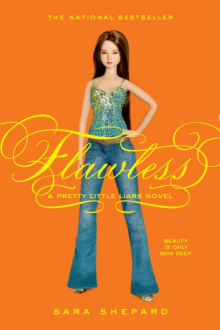 Flawless
Flawless The Elizas
The Elizas Stunning
Stunning Pretty Little Secrets
Pretty Little Secrets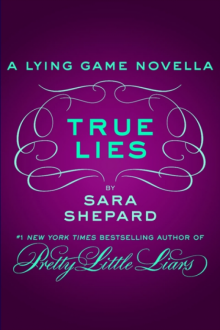 True Lies
True Lies The Good Girls
The Good Girls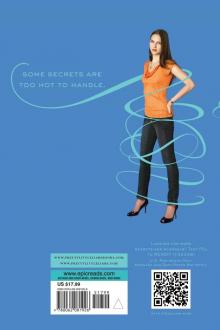 Burned
Burned Perfect
Perfect Pretty Little Liars
Pretty Little Liars Unbelievable
Unbelievable Deadly
Deadly Vicious
Vicious Crushed
Crushed The First Lie
The First Lie Cross My Heart, Hope To Die
Cross My Heart, Hope To Die The Lying Game
The Lying Game Wicked
Wicked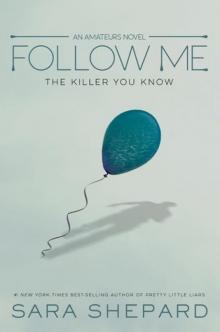 Follow Me
Follow Me Seven Minutes in Heaven
Seven Minutes in Heaven The Perfectionists
The Perfectionists Killer
Killer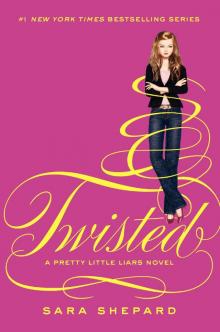 Twisted
Twisted The Amateurs
The Amateurs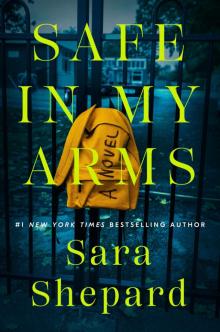 Safe in My Arms
Safe in My Arms Wanted
Wanted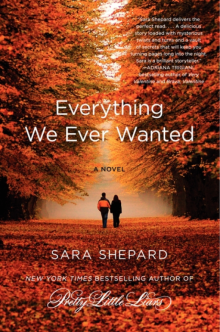 Everything We Ever Wanted
Everything We Ever Wanted Two Truths and a Lie
Two Truths and a Lie The Visibles
The Visibles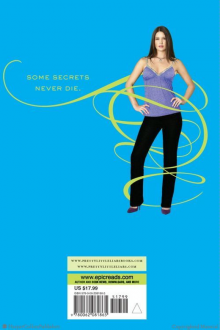 Ruthless
Ruthless Hide and Seek
Hide and Seek The Heiresses
The Heiresses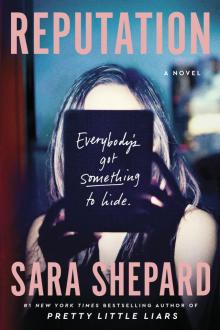 Reputation
Reputation Never Have I Ever
Never Have I Ever Toxic
Toxic Unbelievable pll-4
Unbelievable pll-4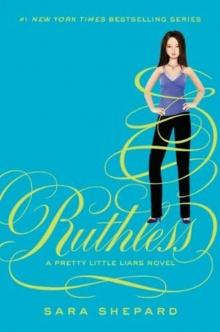 Ruthless pll-10
Ruthless pll-10 Seven Minutes in Heaven tlg-6
Seven Minutes in Heaven tlg-6 Pretty Little Liars pll-1
Pretty Little Liars pll-1 Pretty Little Liars #11: Stunning
Pretty Little Liars #11: Stunning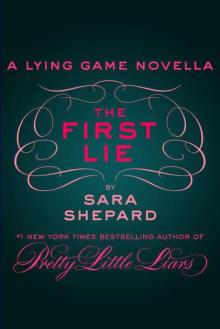 4.5 The First Lie (the lying game)
4.5 The First Lie (the lying game) The Amateurs, Book 3
The Amateurs, Book 3 Wanted pll-8
Wanted pll-8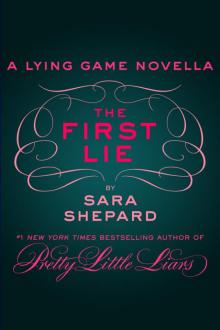 Lying Game 00: The First Lie
Lying Game 00: The First Lie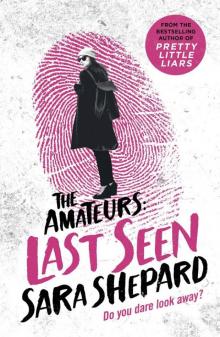 The Amateurs: Last Seen
The Amateurs: Last Seen The Lying Game #6: Seven Minutes in Heaven
The Lying Game #6: Seven Minutes in Heaven Pretty Little Liars #14
Pretty Little Liars #14 All the Things We Didn't Say
All the Things We Didn't Say Stunning pll-11
Stunning pll-11 Heartless pll-7
Heartless pll-7 The Lying Game tlg-1
The Lying Game tlg-1 The Elizas_A Novel
The Elizas_A Novel Perfect pll-3
Perfect pll-3 Burned pll-12
Burned pll-12 Twisted pll-9
Twisted pll-9 True Lies: A Lying Game Novella
True Lies: A Lying Game Novella Pretty Little Liars #9: Twisted
Pretty Little Liars #9: Twisted Two Truths and a Lie tlg-3
Two Truths and a Lie tlg-3 Crushed pll-13
Crushed pll-13 Pretty Little Liars #15: Toxic
Pretty Little Liars #15: Toxic Pretty Little Liars #12: Burned
Pretty Little Liars #12: Burned Killer pll-6
Killer pll-6 Pretty Little Liars 14: Deadly
Pretty Little Liars 14: Deadly